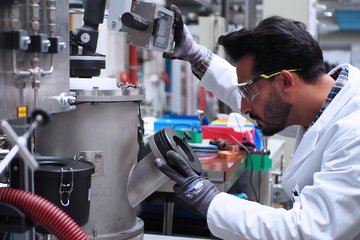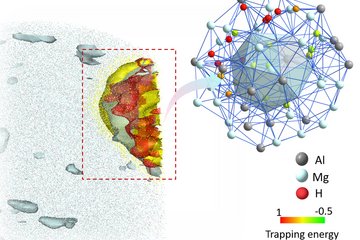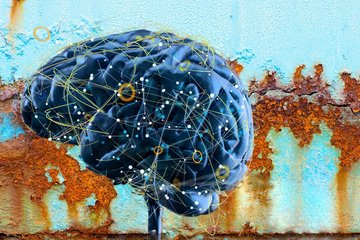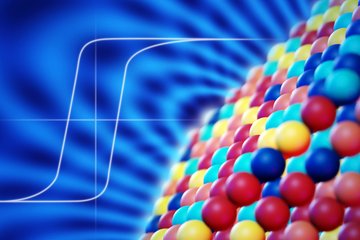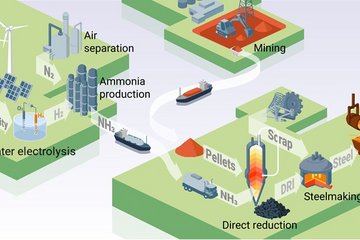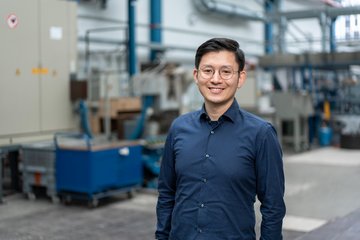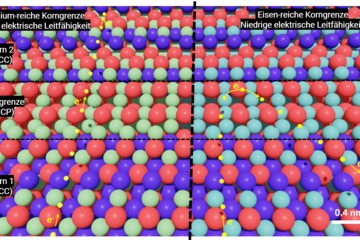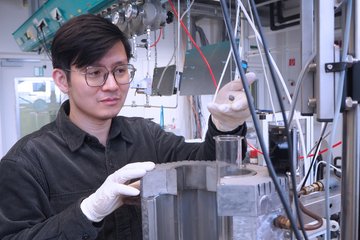Alle Typen
1.
Zeitschriftenartikel
Solution enthalpy of hydrogen in fourth row elements: Systematic trends derived from first principles. Physical Review B 85 (15), S. 155144-1 - 155144-10 (2012)
2.
Zeitschriftenartikel
First-principles study on the interaction of H interstitials with grain boundaries in alpha- and gamma-Fe. Physical Review B 84 (14), S. 144121-1 - 144121-13 (2011)
3.
Zeitschriftenartikel
A density functional theory based estimation of the anharmonic contributions to the free energy of a polypeptide helix. Journal of Chemical Physics 135 (8), S. 084122-1 - 084122-7 (2011)
4.
Zeitschriftenartikel
The object-oriented DFT program library S/PHI/nX. Computer Physics Communications 182 (3), S. 543 - 554 (2011)
5.
Zeitschriftenartikel
Ab initio study on the solubility and kinetics of hydrogen in austenitic high Mn steels. (eingereicht)
6.
Zeitschriftenartikel
Ab initio up to the melting point: Anharmonicity and vacancies in aluminum. Physical Review B 79 (13), 134106 (2009)
7.
Zeitschriftenartikel
First principles free energy analysis of helix stability: The origin of the low entropy in pi-helices. Journal of Physical Chemistry B 112, S. 4109 - 4112 (2008)
8.
Zeitschriftenartikel
Phonon-spectra and thermodynamic properties of the infinite polyalanine alpha-helix: A DFT-based harmonic vibrational analysis. Physical Review E 71, 031911 (2005)
9.
Konferenzbeitrag
Identification of hydrogen related mechanisms in steels using ab initio methods. Proceedings of Steel Hydrogen Conference, Ghent, Belgium, 28. September 2011. (2011)
10.
Vortrag
Hydrogen embrittlement of steels: An atomistic insight. PROST 2012 Conference, Moscow, Russia (2012)
11.
Vortrag
Ab initio investigation of hydrogen solubility and mobility in steels: Indentification of hydrogen related mechanisms in steels. Steel Hydrogen Conference, Gent, Belgium (2011)
12.
Vortrag
Ab initio concepts for an efficient and accurate determination of thermodynamic properties up to the melting point. Calphad XXXIX, Jeju Island, South Korea (2010)
13.
Vortrag
Chemical trends of the solution enthalpy of hydrogen in 3d transition metals in dilute limit, derived from first principles. DPG Frühjahrstagung 2010, Regensburg, Germany (2010)
14.
Vortrag
Computing Ab Initio Free Energy Contributions of Point Defects. DPG Frühjahrstagung 2010, Regensburg, Germany (2010)
15.
Vortrag
Computing Ab Initio Free Energy Contributions of Point Defects. APS March Meeting 2010, Portland, OR, USA (2010)
16.
Vortrag
Computing Ab Initio Free Energy Contributions of Point Defects. 139th Annual Meeting of the Minerals, Metals and Materials Society (TMS), Seattle, WA, USA (2010)
17.
Vortrag
Chemical trends for the solution enthalpy of hydrogen in 3d transition metals. Computational Materials Science on Complex Energy Landscapes Workshop, Imst, Austria (2010)
18.
Vortrag
Ab initio up to the melting point: Efficient sampling strategies of anharmonic free energies. Computational Materials Science on Complex Energy Landscapes Workshop, Imst, Austria (2010)
19.
Vortrag
Ab initio up to the melting point: Anharmonicity and vacancies in aluminum. MRS Fall Meeting, Boston, MA, USA (2009)
20.
Vortrag
Ab initio calculation of phase boundaries in iron along the bcc-fcc transformation path and magnetism of iron overlayers. Seminar at the Department of Materials Physics at Montan Universität Leoben, Leoben, Austria (2009)

